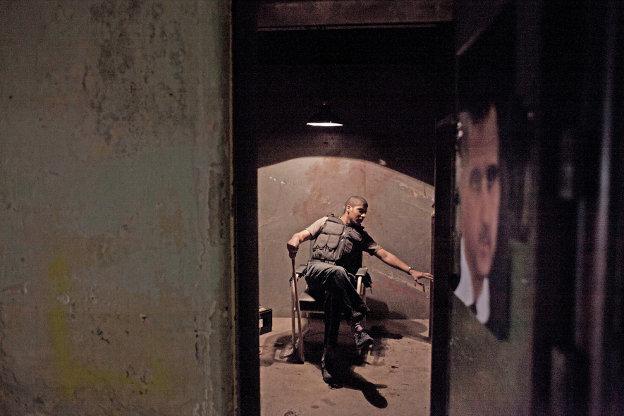‘One of you is a coward,’ declares a deskbound functionary of the Assad regime in a dingy basement office in Damascus. Over his shoulder stares President Assad himself, from a paper poster. Assad is not the coward, at least, not according to his advocate. Someone in the audience is; one of the eight London theatregoers who have embarked upon this immersive tour of a virtual ‘Damascus’. The coward is an undercover journalist, posing as a tourist, who has given information to the anti-Assad Western press from the lobby of a Damascus hotel. The Syrian official wants to know who this coward is. Or, rather, the official already knows, and wants a confession. Immediately.
Such is the simple but effective plot of 66 Minutes in Damascus, an extremely immersive performance piece written and directed by Lucien Bourjeily, on commission for the LIFT Festival. Staged in the labyrinthine recesses of the Shoreditch Town Hall, 66 Minutes in Damascus is an unforgettable tour of Damascus in which the ancient beauty of the world’s oldest continually occupied metropolis remains as invisible as the vast majority of the Syrian people who have been detained or murdered by the Assad regime.
Bourjeily’s characters are individual and composite portraits of some of those ‘disappeared’ whose stories Bourjeily heard from refugees who had made it across the border to Lebanon. They include a history professor locked in a tiny room for twenty years, for being ‘the first to say “no” to the regime’. He revels bitterly in the freedom to criticise a sock puppet President and teaches history lessons to a wooden beam. Two women, pacifist demonstrator Layla (Laila Ali) and militant’s wife Imane (Farah Shaer) agree to disagree on methods though they share their desire for change, a cell, and experiences of humiliation and horror. These people are not cowards; some of them might be called heroes, depending on the historian.
The piece is partly improvisational. All the actors seamlessly segue between impromptu conversations with individual audience members to eloquently scripted bits, some of which complicate the regime’s villainy by having its collaborators make statements with which spectators might agree. Other countries do not tolerate rebellion, which is considered terrorism unless and until it succeeds. Assad was elected “democratically,” at least in theory. Why do we wish to give arms to the revolutionaries of Syria while only Iran will arm those of Palestine? And most importantly, “what is Syria to you? The titter of a leftist dinner party?”
It is also immersive, and Bourjeily’s immersion environment is one of the most pronounced imaginable. Spectators are moved through the space in a manner that is relatively true to the environment depicted and which it would be perverse to call ‘promenade theatre’. Jan McLeod’s soundscape of a trip across Damascus suggests the traversal of a chaotic city by an untraceable route. There are bloodstains on the crumbling walls, courtesy of designer Gary Campbell. The only way there might have been more verisimilitude, within the bounds of safety, would have been if the audience could smell the dust, sweat, and blood. Or if it were possible to forget that the context is a play, its venue is in Shoreditch, and it will be over in less than an hour. As is, this vision of ‘Damascus’ is real enough that one character’s mother’s telephone number is printed in the playbill.
Like the best theatre, 66 Minutes in Damascus also turns the mirror outwards, at the audience. In response to the official’s declaration that there is an illegal journalist in the tour group’s midst, one member of the audience interjected that he knows who it is, and named another spectator. The actors’ reaction brought the play back on script with plausible ferocity, but also raised a difficult question. If we were tourists in Syria, or citizens of Syria, what roles would we play? Would we be collaborators or rebels? Cowards or heroes? If Syrian events were to transpire in our own countries, how would we react? How, then, ought we to demand our politicians react now?
When one audience member was tied to a chair in the supposed torture chamber by a guard, the rest were marched out, abandoning him. Only one – the companion with whom he had arrived – dared to ask, ‘What’s going to happen to him?’ No one insisted upon remaining with him. Although his safety is assured by the knowledge that the situation is artificial, and that Shoreditch is really not Damascus, we ‘act’ what appears plausible, and, for the most part, do what we are told, which is telling. Such complexity might have been granted to the regime’s enforcers, as it is unclear why they support Assad, other than fear; whether anything besides temperament distinguishes them from the heroes in their custody.
While Bourjeily’s shockingly belligerent immersion does not make for a pleasant 66 minutes, it does fulfil a vital purpose. I am not convinced that Bourjeily exploits the incomprehensible suffering of the people of the real Syria. Critiquing the theatre scene of another autocratic tyranny, Louis XV’s France, Jean-Jacques Rousseau condemned ‘the need to occupy the heart’ with a theatre of delightful distraction ‘as if it were at ease inside of us’. Rousseau, whose ideas posthumously fuelled a revolution that reverberates in the structures of modern Europe, would have appreciated Bourjeily’s uneaseful yet insightful expedition on the road to Damascus.


